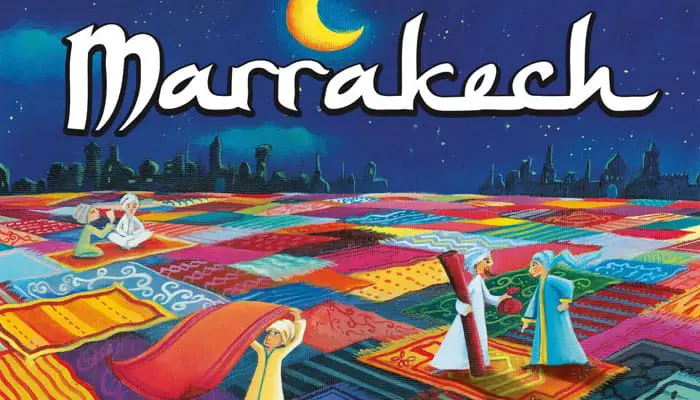

Components
- Rug Market square (board)
- 57 fabric tiles,
- 40 wood playing pieces
- Assam the market owner
- fabric bags
- 6 sided die
- Rulebook
Object of the Game
The rug market in Marrakesh square is on tenterhooks, the best salesperson will soon be named. Each salesperson tries to have the highest number of rugs visible at the end of the game while also amassing the biggest fortune.
The player with the biggest fortune (worked out by adding together the number of visible rugs and the amount of money held by each salesperson) wins.

Setup
Place Assam in the center of the market square. Each player receives 30 Dirhams. If there are 3 players, each receives 15 rugs of the same color which they place in front of them.
If there are 4 players, each receives 12 rugs of the same color. Decide who plays first. Play moves in a clockwise direction, players taking it in turns to play.

Game Play
In turn, players make the following three moves:
- they move Assam,
- if necessary, they pay their opponent,
- they then lay one of their own rugs
Moving Assam
The player chooses in which direction they want to move Assam before throwing the dice, Assam can be left alone or turned 90° left or right (he cannot turn 180°).
The player then throws the dice: the number of slippers indicated on the dice determines how many squares Assam is moved. Assam moves in a straight line (not diagonally) in the direction initially selected.
If Assam leaves the market, he follows the about-turn signalled by the arrows (the arrows do not count as a move).

Payments Between Salespeople
If Assam ends his move on an opposing player's rug, the player must make a payment to the rug's owner.
The amount owed is equal to the number of squares adjoining the square that Assam has landed on which are covered by rugs of the same color: the player must pay the same amount as the number of squares covered.
The sides of the squares must be touching, it does not count if they only touch diagonally; Assam's square counts towards the payment.
The player makes no payment if Assam ends his move on an empty square or on one of the player's own rugs.

Laying Rugs
The player then lays one of their rugs next to the square where Assam has finished, an edge of the rug must be placed against one of the 4 sides of this square.
A rug can be placed on:
- two empty squares.
- an empty square and half a rug (whatever its color);
- two halves of different rugs.
An opponent's mg cannot be entirely covered in one go (it can only be covered completely by two rugs).
End of the Game
The game ends once the last rug is laid. Each half of a rug visible and each Dirham counts as one point, The player with the most points wins the game.
In the case of a tie, the player with the most Dirhams wins.
Two Player Rules
Each player receives 30 Dirhams and 24 rugs of 2 different colors, they should be mixed together in a pile The rugs are then laid in order from the pile
Play proceeds following the 3 or 4 player version indicated above.
Continue Reading

